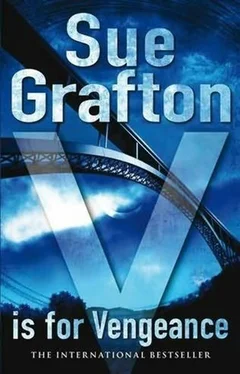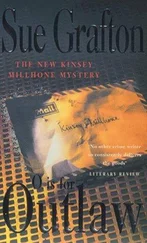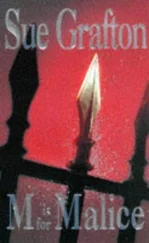“Someone suggested swap meets.”
“Sure, and there are other unregulated vendors-secondhand stores, flea markets, garage sales. You could even take a look at the classified ads in the local paper. The reason most off-market items are taken out of one community and circulated somewhere else is because it’s smart to put as much distance as possible between the source and the final sale. You don’t want someone recognizing a garment they just saw on the rack at Robinson’s.”
“Makes sense,” I said. “What do you know about the fences in town?”
She shook her head. “Can’t help you there.”
“But surely, word gets around.”
“You’d think. Problem is, you make a statement to that effect and you’re risking a lawsuit. These days, criminals have better lawyers than the rest of us.”
“That’s the truth,” I said. I took out a business card and gave it to her, jotting my home number on the back. I was so free with that number, I might as well print it on the front with my office number. “If you think of anything else, would you give me a call?”
“Not a problem,” she said. “Nice seeing you again.”
“Same here. You might see me again if I need additional help. I appreciate your time.” I reached across the counter and shook hands with her.
“One correction,” she said as I turned to go.
I looked back at her.
“You asked me what I know about fences. You didn’t ask me what I suspect.”
The consignment shop June suggested would be of interest was on Chapel in the middle of a run of storefronts I’d seen on countless occasions. There was a crappy-looking little fast-food place on the corner with a take-out window that opened onto the sidewalk. A few dispirited wrought-iron tables and chairs were arranged to one side for the sit-down trade. After rigorous inspection, the health department had awarded this establishment a C, which suggested cockroaches and rat turds where you least expected them. I was so hungry I’d have been willing to compromise my already low standards if the place had been open.
I found a parking spot right out in front, a cause for great joy until I realized all the stores were closed for the day. A sign in the window of the consignment shop indicated the business hours were Monday through Friday, 10:00 to 6:00, and Saturdays, 10:00 to 4:00. A quick look at my watch showed I’d missed by twenty minutes.
To the left of the consignment shop there was a store that sold wigs made of fibers that didn’t come close to resembling human hair. I’ve seen Barbie dolls sprouting better tresses in those evenly spaced plugs that always give me the creeps. The wigs, displayed on featureless Styrofoam heads, would have been perfect if you were forced to attend a costume party at gunpoint. Beyond the wig shop, there was an outlet for bawdy underwear, and beyond that an alleyway with a sign pointing to additional parking in the rear. I walked around to the back and had a look.
All I saw were bulging trash cans and empty parking spots. Every space was earmarked for one of the businesses, with the bawdy underwear store claiming the lion’s share. Behind the consignment shop there was a stack of battered cardboard boxes broken down and bound with twine. Nothing out of the ordinary as far as I could see, but at least I’d satisfied my curiosity.
I drove home and parked Henry’s station wagon in front of his garage beside my Mustang. In the morning, I’d return it to his garage. I did a walkabout in his house. Over the past few days, I’d seen lights winking on and off at burglar-fooling intervals. Living room lamps came on at 4:00 and went off at 9:00 when the bedroom lights came on and then off again at 10:30.
It was almost like having Henry in residence. So far the ruse had worked because no one had broken in. He’d been gone for a week and the very air smelled forlorn. I dampened a sponge and wiped down the kitchen table and the counters, which had picked up a fine haze of dust. Aside from that, all was well. I locked up.
I stopped in my studio briefly, pausing to wash my face. I’d been up for hours, and with the drive to San Luis Obispo and back, I was bushed. I decided on an early supper at Rosie’s, followed by an early bedtime. I turned on my desk lamp and flipped on an outside light in anticipation of my return. I locked my door and walked the half block to Rosie’s. It was close to five when I arrived, and the only other patrons were a pair of day-drinkers who’d probably been sitting on the same stools since noon. Rosie was tending bar and she poured me a glass of bad wine before retreating to the kitchen, where she was apparently preparing one of her zany Hungarian entrées.
William arrived shortly after I did. He was still carrying his wooden cane with the curved handle, which he would occasionally swing in a half arc. He didn’t seem to need it to balance his weight, but it lent him the jaunty air of a man on the move. Judging from his three-piece suit and the shine on his wingtips, I was guessing he’d just returned from a funeral. I expected an outpouring of gossip and information, the sort of inside dope that only an inquisitive chap like William can elicit from total strangers in their hour of grief. Instead, he greeted me with a fistful of pamphlets he’d received from Mr. Sharonson.
“What’s this?” I asked when he’d pressed one in my hand.
“Pre-need funeral arrangements. Take a look,” he said.
Once I heard the term, I couldn’t believe he hadn’t thought of it himself. I gave the information a cursory look while he took out a second pamphlet and opened it. “Just listen to this. ‘Preplanning a funeral allows you to determine the type of service and disposition you’ve always dreamed of. You have time to consider important details and to discuss them with your loved ones. Preplanning spares your survivors the uncertainty of last-minute decisions that may or may not be in keeping with your most cherished beliefs.’ I can’t wait to tell Rosie. She’ll be thrilled.”
“No, she won’t,” I said promptly. “Would you listen to yourself? She’s bossy. She likes to be in control. If you died, she’d be in her element. She’d have Mr. Sharonson in tears, trying to please and appease her. Surely you don’t propose to spoil the moment for her.”
He frowned. “That can’t be true. Are you sure? Because this says ‘Your loved ones can rest assured that the distress of this deeply personal moment has been minimized by your lingering consideration.’”
“Which is the same as taking all the fun out of it for her. Look at it from her perspective. She’s opinionated and overbearing. She’d love nothing better than to tangle with Mr. Sharonson over every everlasting detail.”
“What if we worked on it together?”
“And spoil the current peace? I thought you and Rosie were getting along so well.”
“We are.”
“Then why mess it up? Take my word for it. You bring up the topic, Rosie will have a fit.”
“But it makes so much sense. You think she’d be pleased.”
Rosie used one ample hip to push open the swinging door and emerged from the kitchen with a plate piled with fried potatoes, which she fed to the local drunks in hopes of offsetting the worst effects of alcohol consumption. In one smooth motion, William took the pamphlet from my hand and slid the lot of them into the inner pocket of his suit jacket. Returning, Rosie took one look at him and came to a halt. Her sharp gaze moved from his face to mine.
“Wot?”
He must have guessed that if he said ‘Nothing’ it would be all over for him. She’d know he was getting into trouble of some kind. I stepped into the gap. “I was just asking what smelled so good. He said you were working on a dinner special, but he wasn’t sure what it was called.”
Читать дальше












